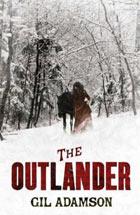
The Outlander was published in 2009 -- 2007, even, in Canada -- how on earth did it pass me by? I suppose in those days I was reading mostly older fiction, and not paying enough attention to newly published stuff? Anyway, I finally caught up with it only because someone who is moving house passed it on to me. And oh how glad I am.
Gil Adamson, whose first and so far only novel this is, is primarily a poet, and if I say this novel is pure poetry, don't get me wrong. Yes, the writing -- the texture of the prose -- is very beautiful, but more than that, there's an imaginative sweep through the plot which is constantly breathtaking, page-turning, endlessly surprising.
It was night, and dogs came through the trees, unleashed and howling. They burst from the cover of the woods, and their shadows swam across a moonlit field. For a moment, it was as if her scent had torn like a cobweb and blown on the wind, shreds of it here and there, useless. The dogs faltered and broke apart, yearning. Walking now, stiff-legged, they ploughed the grass with their heavy snouts.
The first paragraph really encapsulates what it is over-riding theme of the novel -- pursuit and escape. We don't yet know who is being pursued ('her scent') and won't find out till the third paragraph ('the girl') and finally the fourth:
Nineteen years old and already a widow: Mary Boulton. Widowed by her own hand.
This is Mary's story -- 'the widow', as she is most often called. But, like those opening paragraphs, it slowly unwinds through the course of the novel. She's on the run, yes, pursued by two men, red-headed brothers, Large men, identical in every way, standing close by each other, not speaking. These are her husband's brothers, obsessively fixated on revenge. She's lost her baby and shot her husband, though the details of all this will emerge only gradually. Mentally, she is more or less unhinged by what she has gone through, has lapses of memory, see things and people that are not there. But somehow as the days go by, days in which it is surprising she has not died from exhaustion and hunger, she survives long enough to be rescued by a man as isolated and almost as strange as herself -- William Moreland, the Ridgerunner. William rescues her, feeds her, loves her, deserts her. Then again, by some extraordinary chance, she finds herself in a small mining community, living under the roof of the kind, odd, Reverend Bonnycastle, who is building a church for the miners with his own highly unskilled hands and who takes her in and shelters her until the next disaster strikes...
"Winner of the International Association of Crime Writers' Dasheill Hammett Prize", proclaims the cover blurb. Well yes, I suppose in a way this can be described as a crime novel -- a crime of sorts has certainly been committed. But I would never classify it in that way. Yes, again, it's a novel of pursuit, but more than anything I'd call it a novel of survival. Robinson Crusoe comes to mind -- there can be few readers of that novel who don't ask themselves how they would survive on a desert island. Here too you can't help measuring yourself against Mary and wondering how you would fare in the trackless wastes, with no food, no rest, and no idea where you are going.
Physical survival, then, certainly, but mental and emotional survival too. Mary survives through the kindness of strangers, most of them social outcasts, people from whom, in her previous life, she would have run a mile rather than speak to. But she discovers that love is to be found everywhere, even in the most unlikely places. And so yes, this is also a love story, of a heart-rending kind. And on top of all this, it is a real page-turner -- I kept wanting to skip forward, as it was almost unbearable not knowing how things were going to work out. I can't tell you that, of course, but if you haven't read it, I suggest you put it high on the list.
I have numerous family connections with Canada, and am particularly fascinated by stories of how it was in the olden days -- The Tenderness of Wolves, which I also loved, could be a companion piece to this one. People forging lives in the great empty landscapes, the terrors of loneliness and the constant threats of the weather -- and the courage it took to survive all these. All of this is supremely shown in what I can only describe as a truly beautiful novel.
Have you read this yet? If not, why not? :)
